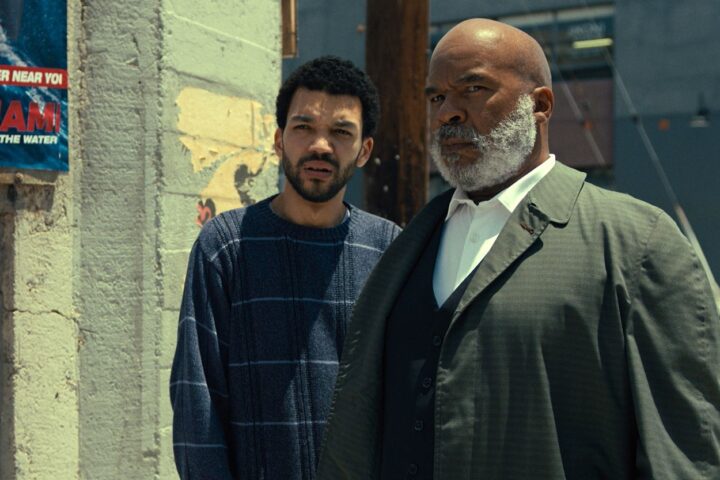For the rest of the world, it seems impossible to watch a U.S.-set production without situating it in relationship to the country’s spectacular self-implosion. This is particularly true of a film as topical as writer-director Michel Franco’s immigration drama Dreams, whose absence of “American” in its title makes the word seem all the more present. That absence may leave viewers with the disturbing sense that, for the foreseeable future, the expression “American dream” could only possibly be used ironically.
Franco’s story follows the turbulent romance between Jennifer McCarthy (Jessica Chastain), an impossibly rich heiress with a philanthropic heart, and Fernando (Isaac Hernández), a dancer from the dance academy in Mexico City that’s funded by her arts foundation. Jennifer is bold enough to escape the prejudiced pressures of her billionaire milieu through a perversely recreational approach to danger whose plug she can pull at any time. That means she’s happy to feed the affair with Fernando—at least before he risks his life crossing the border—with outings by private jet to the home she owns in Mexico City and the excuse of visiting the dance academy.
Yet as soon as Fernando’s presence in San Francisco threatens her social standing, Jennifer tries to hide her lover, pretending that he’s just another of her many objects of benevolence. Her eagerness to maintain the romance behind closed doors makes Fernando decide to leave her, setting off all sorts of rather non-credible plot twists as Jennifer tries to win him back.
Jennifer’s insistence isn’t rooted in love, but in a refusal to accept that she can’t curate every single element of her life. For Fernando’s existence is only interesting for Jennifer as a way to soothe her itch for altruism or her desire for the rough sex that white men can’t give her. Jennifer’s bouts of horniness are perhaps the film’s most redeeming qualities, for in these brief moments the script veers away from the utter predictability of the proceedings and the character’s obsessively curated persona cracks, as if to tell us that desire belies identity.
Throughout Dreams, Jennifer wears a mask over her white cruelty, the kind flashed so nakedly without shame by America today. She’s indeed the ideal American subject: in complete control of her emotions, with a chauffeured SUV always waiting for her when she goes outside. But when desire takes over, albeit swaddled by promises of love, the mask drops and she must surrender to her most unavowable yearnings—for sex or revenge.
In one scene, Jennifer stands before her kitchen island, about to devour a mandarin, when her mind wanders. She fantasizes a crass dialogue between herself and Fernando about him eating her out and fucking her on the countertop. For a second, lovers’ libidinal demands trump expectations around gender, race, and class, with Jennifer playing at being injured. But she quickly gets back to her senses, feigning that to go after what she wants has nothing to do with filling up an emptiness, but with a commitment to excess that denies her vulnerability: the incontestable American art of getting more, which Dreams exposes with blunt obviousness.
Here lies the most perverse aspect of Jennifer and Fernando’s relationship: She doesn’t need him so much as she needs him to need her. The mask over her cruelty finally falls in the film’s last shot. Fernando has gone back to Mexico, and she’s visiting him there. She’s in the back of an SUV after several days of suffering from the collapse of the relationship, about to return to San Francisco for good, but not before relishing the sadism of being a make-believe masochist. And not before destroying what’s no longer of use—leaving the lover behind, like a wounded animal.
Throughout the film, Yves Cape’s camera dutifully lingers on Jennifer’s immaculately composed outfits. But Franco makes no effort to see the magic in Fernando’s dancing. Dreams has a penchant for aestheticization, but the scenes where Fernando performs are mostly shot to downplay the allure of ballet. It’s as if Franco is pledging allegiance to the idea that only the material—gas-guzzling SUVs, Louis Vuitton leather bags, glistening blue satin—constitutes the fabric of dreams. To the camera, then, Fernando is also an instrument to advance the plot, never dwelling on the necessary ambivalence of emotion that ballet elicits, reiterating Jennifer’s immunity to affection and Fernando’s supposed immunity to pain.
Dreams often suggests that the product of a prompt spat into an A.I. chatbot: “Give me Babygirl but through the male gaze and make it vaguely intersectional.” In a scene following one of the lovers’ fallouts, Fernando is working as a bartender at a dive bar when Jennifer walks in dressed like a CEO. She will eventually sit down and chug a stranger’s beer to provoke Fernando—an act more than merely reminiscent of Nicole Kidman’s milk-drinking in Halina Reijn’s film.
At the level of the mise-en-scène, though, it’s a much different film that the sequence recalls: Rainer Werner Fassbinder’s Fear Eats the Soul—namely the iconic opening in which Brigitte Mira’s Emmi first encounters El Hedi ben Salem’s Ali. Here, though, the relationship between unlikely lovers subverts nothing and must be aborted as soon as it unsettles the hegemonic partner’s environment and economy. For this is Jennifer’s preemptively resolved predicament: To surrender to emotions is to spend them, and she can only afford to accumulate.
Since 2001, we've brought you uncompromising, candid takes on the world of film, music, television, video games, theater, and more. Independently owned and operated publications like Slant have been hit hard in recent years, but we’re committed to keeping our content free and accessible—meaning no paywalls or fees.
If you like what we do, please consider subscribing to our Patreon or making a donation.





